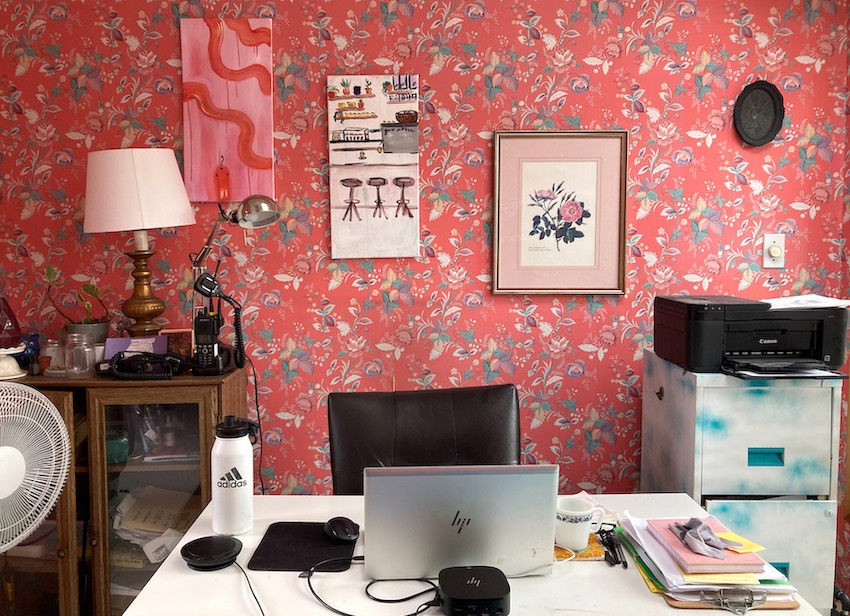
All Hands On Deck: Finding your confidence in emergency management
June 29, 2023
By Maria Nemer
Emergency preparedness advisor Maria Nemer considers the role of confidence and what can happen when you don’t fit the mould in emergency management.
 Maria Nemer works from her home office as an emergency preparedness advisor. Photo: Maria Nemer.
Maria Nemer works from her home office as an emergency preparedness advisor. Photo: Maria Nemer. I’m a lover of routine – and coffee. I start every day pretty much the same: doom scrolling through my phone, coffee, light crime/thriller reading, a quick stretch and then settling into my home office.
I’m an emergency preparedness advisor. My job integrates responsibilities from all phases of emergency management with a stronger focus in preparedness and mitigation, hence my title.
Even though the title has the exciting “emergency” word on it, my day-to-day is mainly on a computer answering emails and attending virtual meetings. In-person contact happens during training on emergency processes and plans, supporting exercises, or responding to an event.
I love my job. I love the excitement of emergencies, thinking about worst-case scenarios and coming up with solutions to problems. I enjoy educating people on how to keep themselves and others safe. I’m grateful to be in my career path of choice with four years’ experience under my belt. I have a long way to go and many things to learn.
I’m in the healthcare sector and my leadership is currently mostly women. Yet healthcare is huge, and many departments, including mine, are male-dominated environments. When I consider my daily struggles, it is not the demands of the job, the stress, or the weight of responsibilities that hold me down, it is my own lack of self-confidence. Enter imposter syndrome.
Emergency management positions are predominantly held by first responders and/or ex-military members. They are passionate about emergency management and tend to continue their careers by transitioning into the strategic part of emergencies instead of response.
Now, if it’s already tough to speak out and disagree with a room full of men, try disagreeing with a room full of men who have paramilitary backgrounds – the people who are trained to keep their cool and take charge during emergency events. These people are not used to being told they’re wrong (they rarely are).
It can be difficult being an outsider; in my case as a woman without “boots on the ground” experience. We may have to repeat ourselves to be heard, or to find ways to share ideas and thoughts in a way colleagues can disseminate more easily. We’re at risk of becoming the go-tos for administrative work, seemingly as the first people who come to mind. Our disagreement might be seen as “sassy” rather than legitimate.
I have learned to succeed, or at least continue to work, in an environment that was not tailored to me. To do so I must fight daily with my instincts. I make sure what I’m saying is factual. I make sure to speak up and share my ideas. I make sure I create relationships with my colleagues beyond the daily weather chat. Even though our interests may differ, there’s almost always a Netflix show in common.
We have all heard the spiel regarding diversity and inclusion, how diversifying the workforce can help companies succeed. Diversity doesn’t come just from hiring women, racial minorities and/or LGBTQ+. It also comes from hiring people with different backgrounds and expertise. But you will not attract a diverse and inclusive workforce if you’re not providing a safe work environment. We outsiders need to continue fighting for our space and to create psychologically safe environments. Employers and colleagues must put in the work as well. They need to reflect on the way they speak to us, and to ensure they’re listening to our concerns, thoughts, and ideas.
If you’re reading this as someone who already fits the mould, consider the ways you can make sure your colleagues feel safe at work. Are there any subconscious biases at play? If you’re assigning work, who are you choosing to do which tasks? Is it fair or based on assumed expertise?
I wish I had an inherent confidence in this field, but my confidence is instead built experience by experience, sometimes shakily, sometimes painstakingly.
I have slowly learned that my opinions are valuable and that I should speak out more if I want to see change. I need to constantly remind myself of my skills, abilities, and the reason I am where I am. Everyday I work to calm nerves that have been built up from generational trauma and years of being told to be quiet. The only way to move forward is to speak up. Be vocal. Let them call you sassy. Speak clearly. Speak to yourself in the mirror if you need to practice. Stop being shy. Talk when you’re not spoken to because you have something to say.
I have worked with amazing women in emergency management who continue to teach me to be resilient in crisis, how to use interpersonal skills as an asset, and how to share concerns with colleagues. The most important thing they’ve taught me is to communicate your needs appropriately with your employer, employees, and colleagues. These amazing, powerful women have paved the way for us. Get out and find them. They will teach you, support you and make you a better person all around.
Relationship building is the glue of emergency management. Put yourself out there and go meet people. Don’t be afraid to speak your mind, or correct people when they address you wrongly. Involve your colleagues in uncomfortable conversations that will create comfortable workplaces.
I wanted to share some of my experiences to safely discuss how we can be and do better to make a workplace environment more inclusive for someone like myself.
If you’re reading this and you don’t fit the mould, don’t give up, speak up and stay genuine to yourself.
Editor’s note: This is the second in Avert’s column series All Hands on Deck, exploring diversity, equity, and inclusion in emergency management. Read the first column from Alishia Ivany here. If you’re interested in writing on this subject, please contact editor Maria Church mchurch@annexbusinessmedia.com.
 Maria Nemer grew up in a small town in Mexico, she moved to Canada with her family 15 years ago and continues to call Nova Scotia home. She enjoys spending time outside, dancing, yoga, and grabbing coffee with friends. Maria is an emergency preparedness advisor with a health care authority. you can spot maria asking for hot sauce at restaurants.
Maria Nemer grew up in a small town in Mexico, she moved to Canada with her family 15 years ago and continues to call Nova Scotia home. She enjoys spending time outside, dancing, yoga, and grabbing coffee with friends. Maria is an emergency preparedness advisor with a health care authority. you can spot maria asking for hot sauce at restaurants.
Print this page